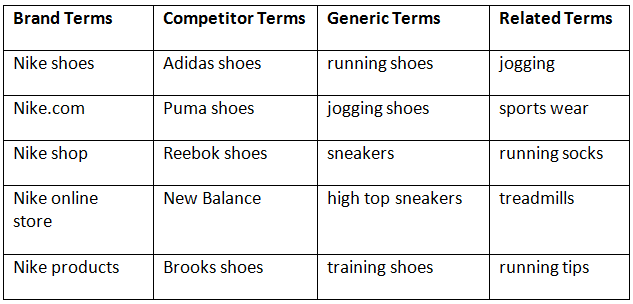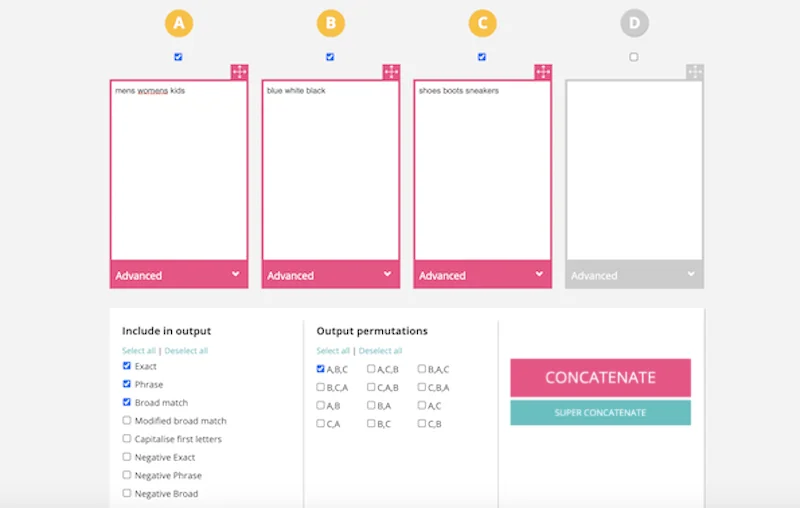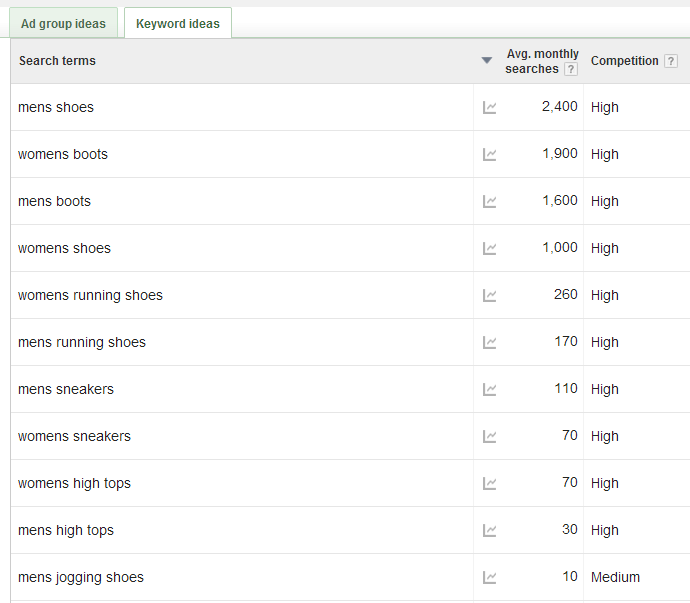Should You Sell Lots Of Brands Of Cameras In The Same Campaign? Why Or Why Not?
Home — Weblog — PPC Keyword Research Guide: How to Observe the Words for Your Paid Search Campaigns
The cornerstone of whatsoever successful PPC campaign is keyword inquiry – choosing the best keywords to bid on that are most likely to issue in clicks and conversions. Keyword inquiry is part science and role art. Information technology's about using the myriad tools at your disposal, but also understanding your customers and predicting which terms they're actually typing into the search box. That's the best way to ensure that your ads evidence upwards at the correct fourth dimension and in the right identify: when they're searching for the kinds of products or services y'all offering.
In this guide, you'll learn a set of methodologies to help you acquire, refine, and organize your PPC keywords, all in the service of better targeted and more constructive pay-per-click campaigns.
Getting Started: Brainstorming a PPC Keyword List
The starting indicate for keyword research (which you lot can use our Free Keyword Tool for!) should be the website landing page(due south) that your ads will be linking to. Begin by scanning each page and harvesting relevant keywords from the text. Assuming you lot accept a website with well-written and relevant copy, there should be enough material to put together a fairly comprehensive list of keywords that directly relate to your products or services.
Keywords can be broadly organized into the following types:
- Brand terms – any keywords containing your make proper noun and trademarked terms.
- Generic terms – terms relating to products (e-commerce keywords) or services offered.
- Related terms – terms that don't directly relate to what you lot're selling, but that users who want your products or services may be searching for.
- Competitor terms – the brand names of competitors who are offering similar products and services to yours.
For instance, if I was researching a campaign to advertise Nike running shoes, my listing might await like this:
Note: Bidding on a competitor's brand terms is usually expensive, and tin can speedily chew through a modest budget, and then unless you take a comfortable cushion of coin to play with and/or you're specifically running a "conquest" blazon of campaign, think carefully near whether the return on investment is worth it.
Some more tips for the keyword brainstorming stage:
Put yourself into your customers' shoes. What kinds of words and queries would they need to type (or speak) into the search box to bring them to your website?
Kickoff with broad keywords, and move to the specific. For example:
Shirts -> women's shirts -> women's long-sleeve shirts -> women'southward black long-sleeve shirts
Include variations and synonyms in your keyword list. Search engines can sometimes brand connections between related terms (such as realizing that "sneakers" and "running shoes" are the same product), but not always, so it's best to include them – especially if you're planning to fix your match blazon to Exact. Ditto for brusque forms, abbreviations, and even plurals.
Taking the keyword "womens long-sleeve shirts" from to a higher place, I'd probably jot down variations like:
- Women's long-sleeve shirts
- Women's long-sleeve tees
- Women's long-sleeve Ts
- Women's long-sleeve t-shirts
- Women's long-sleeved shirt
- Ladies long-sleeve shirt
Consider specificity when selecting keywords. Sometimes information technology can be beneficial to include broad or "head" terms in a entrada (normally single words or curt phrases) because they have higher search volume – all the same, a broad keyword like "shirts" could exist used past people searching for women's shirts, kid'south shirts, men'due south shirts, so on, then your product won't always be relevant to them. On the other hand, a very specific, long-tail keyword phrase like "men's blackness long-sleeve shirts" might only get a scattering of searches per calendar month, only the user will be much more likely to click your ad and follow through with a purchase, because it'southward exactly what the person is looking for. As an added bonus, long-tail keywords are less competitive and therefore less costly.
Including keywords that are related to your product or service can be beneficial to alluring customers that will likely exist interested in what yous're selling. For instance, if you sell canis familiaris nutrient you could include topics that dog owners would search for, such every bit dog grooming, domestic dog breeds, dog health issues, dog sitters, dog accessories, so on.
Y'all tin apply a technique chosen "concatenation" to quickly expand keyword lists by merging columns of words together using online tools similar mergewords or Establish's Ultimate PPC Keyword Concatenation Tool, or the =CONCATENATE() command in Microsoft Excel. In the example below I've put the production in the third column, and two modifiers (type and colour) in the left and eye columns, and the tool generates a list of all possible permutations of those nine terms.
Considering people don't e'er blazon in perfect English, keyword research can also include misspelled words (Christmas, Cristmas, Chrismas, Chritmas) besides as alternating spellings (Hannukah, Chanukah, Hanukah, Hannuka). A discussion of alert, though: don't include misspelled keywords in an advertisement group if y'all're using Dynamic Keyword Insertion (DKI) in your advertizement copy. This will pull the misspelled keyword into your advertizement and brand it look unprofessional. Create a split up ad grouping for misspellings. Besides, annotation that Google has gotten very adept at recognizing misspellings, so this step is not altogether necessary.
Search engines are increasingly able to empathise longer strings of words, in a nod to the growing number of voice-led queries from people speaking questions into their mobile phones to search for things on the get. Be sure to accept this into business relationship, and include not only search terms that might come up from a keyboard, but terms that reflect how people actually speak – they aren't one in the aforementioned. For example, a more traditional search query might exist "Thai restaurants New York" but someone searching on a phone might say "what's the best Thai eating house in New York?" or "where can I get Thai food in New York?" Don't be afraid to include variations such as "How can I…?" "How do you…?" "Where can I…?" and "What is…?"
Expand and Refine Your List with Keyword Enquiry Tools
Armed with a decent list of terms to bid on, the next step is to use the keyword research tools at your disposal to decide which keywords to keep, and which to drib. It's not enough to only keep your gut – keyword tools help you zip in on the terms that people are actually typing into search engines. There are dozens of tools to requite you lot insights into how popular certain keywords are, from Google's Keyword Planner (included within Google Ads, formerly known as AdWords) to WordStream's free Keyword Proposition Tool.
Each keyword tool is a little different, but the key stat you're looking for is search book. The higher the search volume, the more than people are searching for that given term per month.
The Google Ads Keyword Planner besides assigns a "Contest" rank of high, medium, or low. A loftier contest rating means that more advertisers are bidding on these terms, which ways you'll take to pay more to get your advert to the top positions.
In the case in a higher place, the search term "mens jogging shoes" at the bottom of the list has a depression search volume – an average of merely 10 searches per month. All the same, on the plus, side the competition index is lower.
High-volume, depression-competition keywords are the sweetness spot you should be looking for – keywords that will bulldoze substantial traffic without costing you lot a fortune.
Some, keyword tools, like the Keyword Planner, can too suggest additional keyword ideas that you missed in your initial list. Free online tools like Ubersuggest and Soovle can aid with this every bit well – simply type in a keyword and the tools will spit out a list of variations.
MORE: The eight Best Keyword Research Tools for PPC & SEO
If keywords have petty or no search volume, or the competition is so high that the price of behest on that keyword would eat up your upkeep as well quickly, drib them from the list. Using the keyword tool you should be able to prune back certain keywords while discovering new terms that you hadn't idea of.
It's fourth dimension to detect out which keywords are called-for your upkeep. Get a free account inspect with our Google Ads Performance Grader today!
Sorting and Organizing Your PPC Keywords
By now you should accept a pretty impressive keyword list. Information technology's now fourth dimension to sort your list into pocket-sized, targeted groups of keywords that are closely related to each other. These groupings will correspond to your ad groups in Google Ads (or Bing Ads, etc.).
If yous're selling a straightforward list of products or services, a good rule of thumb is for your advert groups to mimic the structure of your website. For example, if you're selling dog food, your campaign might look something similar this:
Brand – Purina Dog Nutrient
Make – IAMS Canis familiaris Food
Brand – Royal Canin Canis familiaris Food
Generic – Dog Nutrient
Generic – Dog Food – Chicken
Generic – Dog Food – Beef
Generic – Dog Nutrient – Kibble
Generic – Puppy Food
The tighter and more than focused your ad groups are, the easier it will exist to:
- Mensurate the performance of each keyword
- Clip or expand your lists if necessary
- Create highly specific and relevant ads
This last betoken is especially crucial. Small, tightly organized advertising groups accept multiplying beneficial effects on your business relationship. Well-organized campaigns have more than relevance, and higher relevance leads to college Quality Scores, which (as we've told you many times) simultaneously increase your advert rankings and reduce what you lot pay for each click and each conversion. Healthy PPC accounts always accept healthy Quality Scores, and potent keyword organization can go a long manner toward improving your scores.
More than: 4 Steps to Better Keyword Grouping
Don't Forget to Add Negative Keywords
Equally you create your keyword listing, don't forget almost negative keywords. These are the search terms that yous don't want your ads to testify up for, and they're an important role of any campaign, considering they aid control costs and keep your advertisement targeting every bit relevant as possible.
The main reason to include negative keywords is to prevent your ads – and, by extension, your make – from showing up alongside search queries that are irrelevant or offensive. For example, a seller of high-end furniture would want to target affluent customers, and would add together terms similar "cheap" and "gratis" to the negatives list to prevent their ads for appearing alongside those terms. You'll besides want to rule out impressions on terms that are similar to but non really related to your business organization – such as "hair dryer" if yous sell habitation appliances including washers and dryers.
Here are some tips for finding negative keywords for your PPC campaigns:
- Go along an eye on your search query reports. This is a slap-up way to find out what searchers are looking for when Google serves your ad. If you see words in your search query report that you know are not a good fit for your account, set them equally negatives earlier you lot run the risk of showing for them over again.
- Know your negative match types. The match type that yous assign to a negative keyword has an enormous impact on what traffic it blocks. As a full general rule of thumb, use broad friction match negatives to disqualify any query that contains your negative term, such equally "gratis." Use phrase and exact lucifer negatives to disqualify more specific queries that incorporate long-tail negative keywords.
- Explore negative keyword options earlier your campaign goes live. The more negatives you fix before a campaign goes live, the more than cash you'll relieve right off the bat. There are many tools out there to aid you discover potential negatives, based on your current keyword choices.
- Remember that you can apply multi-level negatives. Chances are, you lot volition place some negatives that are good fits across multiple advert groups or campaigns.
- Don't go overboard! Negatives are an important aspect of whatsoever PPC campaign, merely an improperly used negative can hurt your business relationship and kill your impression volume. Equally you set each negative, be certain that, should a searcher employ that term, it is highly unlikely that they would convert on your site.
Finally, keep going! Yous're non going to discover every keyword you should bid on (or exclude) in PPC on the first go, so iterate on keyword research regularly. Nosotros recommend spending about 15% of your PPC management time to PPC keyword research. Ideally, you'll do a little bit of keyword research (adding new keywords, setting new negatives, or experimenting with new friction match types) every week. Over time, your business relationship will get stronger and more relevant considering of it.
Source: https://www.wordstream.com/blog/ws/2013/11/21/ppc-keyword-research-guide
Posted by: cookboun1947.blogspot.com




0 Response to "Should You Sell Lots Of Brands Of Cameras In The Same Campaign? Why Or Why Not?"
Post a Comment